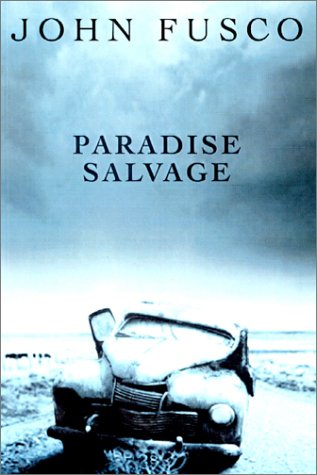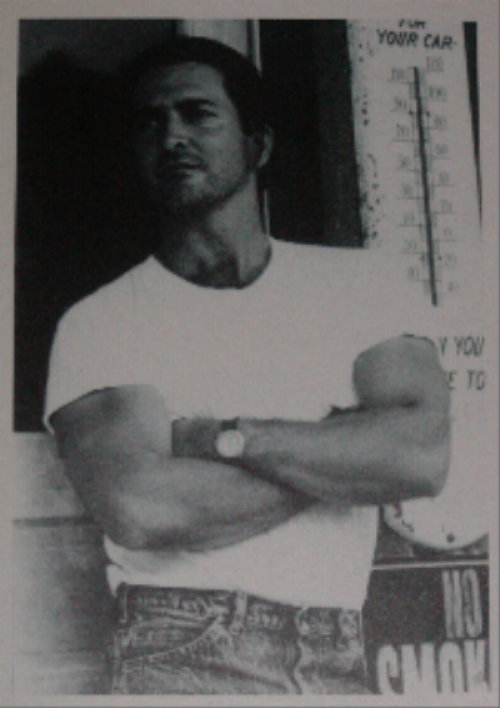Review of John Fusco's Paradise Salvage
Waterbury (CT) Republican-American
January 13, 2002
by Alfred Rosa
 What
a great read John Fusco provides in his debut novel set in Saukiwog Mills,
a fictionalized Waterbury, Connecticut. Fusco grew up in Waterbury
and still has relatives and friends in Town Plot. He pays tribute
to his roots, but it is, despite uproariously funny passages, a somewhat
mournful celebration.
What
a great read John Fusco provides in his debut novel set in Saukiwog Mills,
a fictionalized Waterbury, Connecticut. Fusco grew up in Waterbury
and still has relatives and friends in Town Plot. He pays tribute
to his roots, but it is, despite uproariously funny passages, a somewhat
mournful celebration.
Once proud and strong, Waterbury’s City Hall again reels from charges
of political corruption. So what could be more timely than the story
twelve-year-old Nunzio Paradiso tells as he is wrenched from his innocence
and thrust into the world of experience? For Nunzio and us, the novel
is both a love-song to his people and a horrible look into the abyss, a
look at Waterbury as she used to be and as she has sadly become.
In the tradition of Dickens, Twain, and Salinger, Fusco’s main character
struggles on many fronts, but he is wise and big-hearted and gives a good
account of himself. Fusco’s control as a novelist is amazing.
He immediately makes us at home in the Paradiso family, orchestrates a
suspenseful and believable plot, unfurls the ethnic tapestry of the city,
and provides memorable characters who are rich in language. Paradise
Salvage is a carefully researched and generous work, and the best literary
treatment that Waterbury has yet received.
Not since Pietro DiDonato’s Christ in Concrete, the classic masterpiece
of Italian American literature, have we been blessed with such a realistic
portrait of life in Little Italy. Unlike that 1939 masterpiece which
focuses on the poor immigrant class, Fusco delivers, through Nunzio’s
sharp eyes and quick tongue, the essence of the Italian American middle-class
experience in the latter part of the last century.
 Against
the rich backdrop of the city’s ethnic diversity—Italians, Irish, Lithuanians,
Scots, Germans, Poles, Portuguese, Puerto Ricans, African Americans, Cambodians,
French Canadians--Fusco’s narrator struggles to understand the reason why
a man has been murdered. Nunzio Paradiso, whose family owns Paradise
Salvage, spends the last summer of his childhood working in the junkyard.
There he finds the body of a brutally murdered man in the trunk of a wrecked
’73 Pontiac Bonneville, but before he can convince his brother and father
of his discovery the car is fed to the Green Monster, the junkyard’s crusher.
Against
the rich backdrop of the city’s ethnic diversity—Italians, Irish, Lithuanians,
Scots, Germans, Poles, Portuguese, Puerto Ricans, African Americans, Cambodians,
French Canadians--Fusco’s narrator struggles to understand the reason why
a man has been murdered. Nunzio Paradiso, whose family owns Paradise
Salvage, spends the last summer of his childhood working in the junkyard.
There he finds the body of a brutally murdered man in the trunk of a wrecked
’73 Pontiac Bonneville, but before he can convince his brother and father
of his discovery the car is fed to the Green Monster, the junkyard’s crusher.
After winning his brother Danny Boy to his side, the two set out to
solve the mystery of the murder less as a matter of justice than as a way
of protecting the family from the killers who might try to silence them.
The effort quickly brings them to Goomba Archangelo Volpe, one of the most
skillfully drawn and vibrant characters in contemporary fiction.
Angelo is nasty and crude, a hardened character who knows his way around
the city’s underworld. As an ex-cop he has been over this ground
before, and he has paid for his miscalculations by having been turned into
a miserable, misanthropic quadriplegic. It is Angelo, finally, who
leads Nunzio and Danny Boy into the inner workings of a rat’s nest of corruption
involving, developers, construction companies, city hall, the mob, and
kickbacks. Fusco will soon produce and direct the film version of
Paradise Salvage and so fascinating a character is Angelo that the actor
lucky enough to play him on the screen could find himself an instant success.
What is so clever on Fusco’s part is the way he wraps Nunzio’s coming
of age around the story of why the man in the trunk has been murdered.
Readers will recognize the Italian deli on the hill, Holy Land USA near
the old Scovill Mill, Route 8, green slime in the Naugatuck River, the
Big Clock where this newspaper is published, Soldier’s Horse on the Green,
sleazy strip joints, chop shops, seedy apartment buildings, and perhaps
even the smell of almonds and the taste of the crunchy sfogliatelle
in Fusco’s warm tribute to one of my childhood shrines, Ortone’s Pastry
shop.
What grabs our attention more than the landmarks, though, are the accurate
and telling details of life in the Little Italian Boot, the close-knit
Pontelandofesi, the Calabrese, the food--baccala, soprasatta, braccioli,
biscotti, fusilli, and calamari. It’s the comparatico,
the system of godmothers and godfathers (Nunzio has three goombas but none
who really knows him) that’s realistic and endearing to all of who grew
up in this world. And it’s the malocchio revisited for us,
as Nunzio learns the secrets of his heritage from tribal elders.
Added to the novel’s great sense of Italianita is the love of story
telling and the Scottish burr of Nunzio’s mother Nancy, once an outsider
but now a validated and honored member of the Italian clan.
Life in Saukiwog is filled with vividly realized characters whose language
is so authentic and natural you become a part of the conversation.
We have the harmless dialogue of the youngsters that turns raw and lusty
in the mouth of Nunzio’s older brother Danny Boy and stern in the contemptuous
snarling putdowns of Big Dan, their father. And, by turns, we have
black slang, Spanish American dialect, and the clipped wiseguy talk of
the toughs who people the seamier side of Nunzio’s story. There’s
tabooed language here, quick and dirty retorts, taunts, and verbal swings
and counter-punches. As a screenwriter, Fusco knows that language
is character, that “You are what you say.”
 Fusco
also wisely allows Nunzio to tell his story, to show us his world through
his own eyes. His is a world of cars, cars that are full of life
and cars that are entombed, and the images and figure speech that come
naturally to him are those of the world as he sees and knows it.
Hence, his fascination with automobiles as the place in which we live and
die, think and dream, eat and sleep, find and lose, love and deceive, spy
and plot, and identify and reinvent ourselves is quite brilliant.
Fusco
also wisely allows Nunzio to tell his story, to show us his world through
his own eyes. His is a world of cars, cars that are full of life
and cars that are entombed, and the images and figure speech that come
naturally to him are those of the world as he sees and knows it.
Hence, his fascination with automobiles as the place in which we live and
die, think and dream, eat and sleep, find and lose, love and deceive, spy
and plot, and identify and reinvent ourselves is quite brilliant.
Fusco does so many things so well in this novel. What’s refreshing
and innovative for me, impressive really, is his ability to weave the love
of cose Italiano, of things Italian, into his main character’s struggles
in dealing with the adult world and the threat he faces. In Nunzio’s
move from innocence to experience, Fusco particularizes the larger story
of the efforts of Italian Americans to hang onto the best of la via
vecchia, or the old way, while negotiating la via nuova, the
new way of life. In that regard he also intimates the struggles of
all ethnic groups to hang on to what’s genuine, to assimilate, and to fight
off the evil that threatens them. It is, after all, the great story
of America itself.
Alfred Rosa, whose grandparents lived on Washington Avenue, is a
native of Naugatuck. He is Professor of English at the University
of Vermont in Burlington, Vermont.
Return to English 187: Italian American Literature
 Against
the rich backdrop of the city’s ethnic diversity—Italians, Irish, Lithuanians,
Scots, Germans, Poles, Portuguese, Puerto Ricans, African Americans, Cambodians,
French Canadians--Fusco’s narrator struggles to understand the reason why
a man has been murdered. Nunzio Paradiso, whose family owns Paradise
Salvage, spends the last summer of his childhood working in the junkyard.
There he finds the body of a brutally murdered man in the trunk of a wrecked
’73 Pontiac Bonneville, but before he can convince his brother and father
of his discovery the car is fed to the Green Monster, the junkyard’s crusher.
Against
the rich backdrop of the city’s ethnic diversity—Italians, Irish, Lithuanians,
Scots, Germans, Poles, Portuguese, Puerto Ricans, African Americans, Cambodians,
French Canadians--Fusco’s narrator struggles to understand the reason why
a man has been murdered. Nunzio Paradiso, whose family owns Paradise
Salvage, spends the last summer of his childhood working in the junkyard.
There he finds the body of a brutally murdered man in the trunk of a wrecked
’73 Pontiac Bonneville, but before he can convince his brother and father
of his discovery the car is fed to the Green Monster, the junkyard’s crusher.
 What
a great read John Fusco provides in his debut novel set in Saukiwog Mills,
a fictionalized Waterbury, Connecticut. Fusco grew up in Waterbury
and still has relatives and friends in Town Plot. He pays tribute
to his roots, but it is, despite uproariously funny passages, a somewhat
mournful celebration.
What
a great read John Fusco provides in his debut novel set in Saukiwog Mills,
a fictionalized Waterbury, Connecticut. Fusco grew up in Waterbury
and still has relatives and friends in Town Plot. He pays tribute
to his roots, but it is, despite uproariously funny passages, a somewhat
mournful celebration.
 Fusco
also wisely allows Nunzio to tell his story, to show us his world through
his own eyes. His is a world of cars, cars that are full of life
and cars that are entombed, and the images and figure speech that come
naturally to him are those of the world as he sees and knows it.
Hence, his fascination with automobiles as the place in which we live and
die, think and dream, eat and sleep, find and lose, love and deceive, spy
and plot, and identify and reinvent ourselves is quite brilliant.
Fusco
also wisely allows Nunzio to tell his story, to show us his world through
his own eyes. His is a world of cars, cars that are full of life
and cars that are entombed, and the images and figure speech that come
naturally to him are those of the world as he sees and knows it.
Hence, his fascination with automobiles as the place in which we live and
die, think and dream, eat and sleep, find and lose, love and deceive, spy
and plot, and identify and reinvent ourselves is quite brilliant.